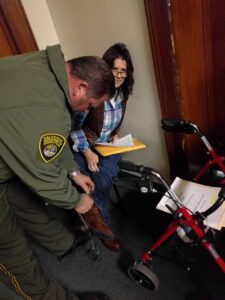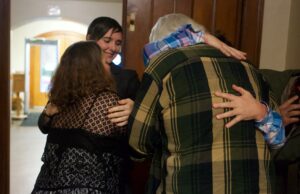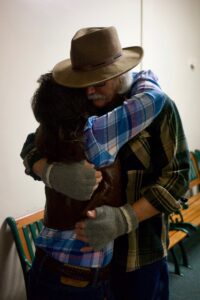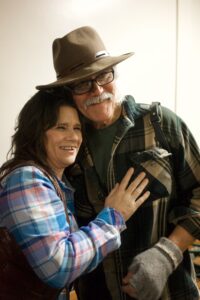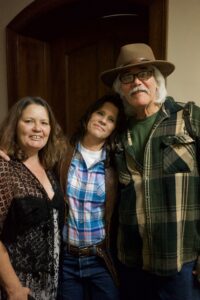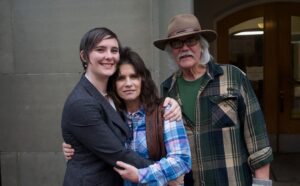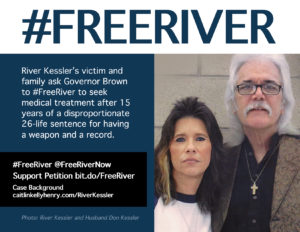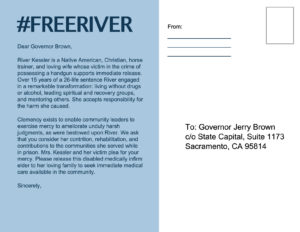Victory! River Is Free!
February 4, 2019
Upon CDCR’s recommendation due to her extraordinary conduct, a judge recalled River’s sentenced after nearly 16 years! Snow began falling as the judge commended her post-conviction accomplishments, re-sentencted her, and ordered her release! A group of family and friends joyously embraced her as she left the courthouse. She thanks everyone who supported the #FreeRiver campaign and signed post cards and the online petition that she submitted to the Governor and the judge to show the community supported her quest for freedom.
_________________
Archived Background Information
Sign Here!
Disabled Indigenous Woman River Kessler Seeks Clemency from Governor Jerry Brown for Extreme Three Strikes Life Sentence. River Urges Brown To Continue Releasing Disabled and Infirm Elders Suffering from Racially Disproportionate and Excessive Prison Terms in Which CDCR Denies Medical Care and Disability Accommodations.
Supporters are urging Governor Brown to release River via an online support campaign.
Hashtags: # ReleaseRiver #FreeRiver #RiverKessler
Chowchilla, CA – After fifteen years of exemplary prison programming and community service under a “Three Strikes” 26-to-life sentence for possessing a firearm, River Kessler seeks a commutation. River, an indigenous, ill, and disabled woman, has fallen through the cracks of sentencing reforms fueled by data showing these severe punishments are racist and not penologically sound. River, states “I take full responsibility for my crime, past behaviors and the harm I caused during a period of my life heavily influence by my substance use. Because of what I did I lost the privilege of living in my community and I victimized an acquaintance and my husband…We can either become a product of our environment or we can change the person that brought us here. I chose to change the person that I was.”
River Kessler is a spiritually-minded horse trainer who descends from Creek, Cherokee (Eastern and Western bands), Choctaw, and Penobscot families. In 2003 the Tuolumne Court sentenced River to a Three Strikes term of twenty-six years to life for possessing a firearm. Although the district attorney initially offered a four-year plea to River’s now-disbarred attorney, she is now serving the fifteenth year of her sentence. The Ninth Circuit denied her final appeal on April 27, 2018. Since its May 25, 2018 launch, her online support campaign gained over 500 signatures. River submitted her commutation petition, which included a letter of support from her victim, to Governor Brown on June 7, 2018.
River states, “I have worked to identify why I behave that way and changed.”
National interest in the executive pardon power is trending as, on June 6, 2018 President Trump, granted a pardon to Alice Marie Johnson after public support via change.org petition and Kim Kardashian West’s advocacy. Jerry Brown started to exercise the California Governor’s under utilized clemency power to pardon people out of custody and grant commutations to shorten sentences or release people in custody. In 2017 he granted seven commutations around Easter, nine in August, and nineteen around Christmas. In March of 2018 he granted fourteen. In the Governor’s final seven months he is expected to grant more.
Californians are re-examining three strikes life sentences because data indicates they don’t result in deterrence or increased public safety, and result in racialized sentences disproportionately impacting people of color and physically disabled people. Voters and legislators are acting to overturn these laws and afford opportunities to retroactively challenge extreme sentences and gain release. Reforms are in part due to recognitions of nation-wide trend of disproportionally high arrest, prosecution, and incarceration rates for Native Americans, particularly women. Voters, judges, legislators, and advocates continue to intervene with initiatives to stop the California Department of Corrections and Rehabilitation’s (CDCR) widespread mistreatment of elderly, medically infirm, and disabled people. However, River is falling through the cracks of these reforms.
River is a medically infirm, disproportionately aging fifty-four-year-old struggling with five serious diagnoses and CDCR’s denial of disability accommodations and potentially lifesaving medical care. Her exceptional fifteen-year prison record includes frequent participation in self-improvement and community service activities, including leading spiritual and recovery groups despite suffering severe pain and limited mobility.
River explains how she spent second term of incarceration differently than her first: “At the time of the investigation into the incident my pride and anger stood in the way of admitting guilt and taking responsibility for my actions.” “In prison I completed a number of programs that challenged me to confront the person I was before coming to prison.” “I know I can’t take back the damage I’ve done, but I’ve committed my life to being a positive role model moving forward.”
River’s victim states: “I am the victim of the crime of which Kelly Kessler is hoping to get a commutation. As I stated in the original sentencing I don’t believe that she needed that kind of punishment. I still believe that whole heartedly. I wish you would just open the gate and let the girl go home.”
River seeks to receive necessary medical care in the community, rejoin her loving husband, and continue caring for animals.


